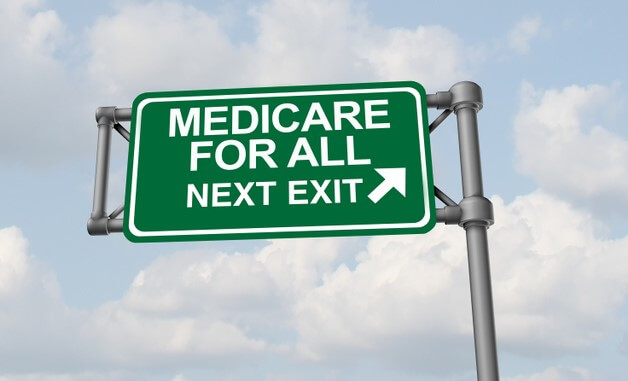As campaign season for the 2020 presidential election ramps up, one of the biggest topics of debate is health care in the United States. Self-proclaimed “Democratic Socialist” Bernie Sanders and others have their “Medicare for All” proposals, a costly plan that would eliminate private insurance and provide government-run health care for any and all.
While free health care for all Americans sounds like a great idea, the biggest issue is how to actually pay for it. One study last year estimated the cost at over $32 trillion, and a lot of those funds would have to come from tax increases. Also, the federal government would naturally have to increase in size to take on the duties currently maintained by private insurance companies.
This sounds like a Republican’s nightmare, right?
Not for one former-GOP lawmaker and business owner, apparently. David Steil represented the 31st District in the Pennsylvania House of Representatives for 15 years, and he claims to be as far from a socialist as is possible. But Steil believes there’s value to the controversial health plan.
Here is Steil’s argument for why more Americans, regardless of party affiliation, should consider supporting Medicare for All, per USA Today:
From 1993 to 2008, I served as a lawmaker with the Republican Party, representing the 31st District in the Pennsylvania House of Representatives, while also building my manufacturing business from the ground up.
In many ways, my story is typical of what the American vision of free market capitalism can deliver. It might surprise you to know that I’m also part of the growing coalition of people nationwide who support Medicare for All.
Despite the fact that Medicare for All has gained traction in large part due to our country’s most famous democratic-socialist, Sen. Bernie Sanders, I’m about as far from a socialist as you can be.
But I know that if we’re going to grow, expand and improve our market-based economy, it’s time to drastically overhaul the way we finance health care.
I also believe it’s possible for markets to fail, because there are services that they’re incapable of providing efficiently. There’s no better example than our health insurance system.
Health care is a market failure
To work well, markets require educated consumers, cost-responsive demand and, most importantly, choice. Across all three metrics for success, our current health insurance system is failing.
The current state of health care delivery leaves patients with a huge information disadvantage. Even if we could access all the information about treatments, medications and pricing — which we normally can’t — almost none of us have the knowledge base to understand it. That allows insurance companies to artificially inflate prices, with little oversight or accountability.
No matter how high prices get — and they are driving health-care spending to an all-time high — we need the same amount of health care. But as insurance companies raise the prices of life-saving treatment, they force people to ration their care, at the cost of their health.
The result: Patients have very few choices in our health care system. Most of the time, the options are to get treatment, or risk even more harm, even if you don’t like the doctor or hospital that your insurance company has directed you to. After all, patients can’t shop around for more affordable doctors from the back of an ambulance.
When medical costs are the primary reason for bankruptcy in this country, there’s no way to spin the truth. Across political parties, lawmakers must have the courage to say, plainly and simply, that our dysfunctional health care system is a market failure.
Medicare for All will expand economy
We must fix this market failure, to save lives and create a more robust economy. Medicare for All offers the best solution.
Relieving businesses of the responsibility of employer-sponsored insurance, which is now priced at $19,616 a year for a family plan, will help expand our economy — by creating jobs, raising wages, maintaining our ability to compete internationally, and supporting small and mid-sized businesses like mine that are starting to buckle under the burden. In recent years, my costs have been rising 8% annually, and that’s low compared to some of my peers.
Medicare for All will also encourage entrepreneurship, the bedrock of our economy. Why? Because people can pursue new jobs and careers knowing that they won’t lose access to health care for themselves or their families.
Sen. Sanders and other proponents of Medicare for All are free to frame the policy as a component of democratic socialism. However, when it comes to health care, their democratic socialism and my capitalism are in agreement.
Let’s focus on the policy, not on loaded terminology.




